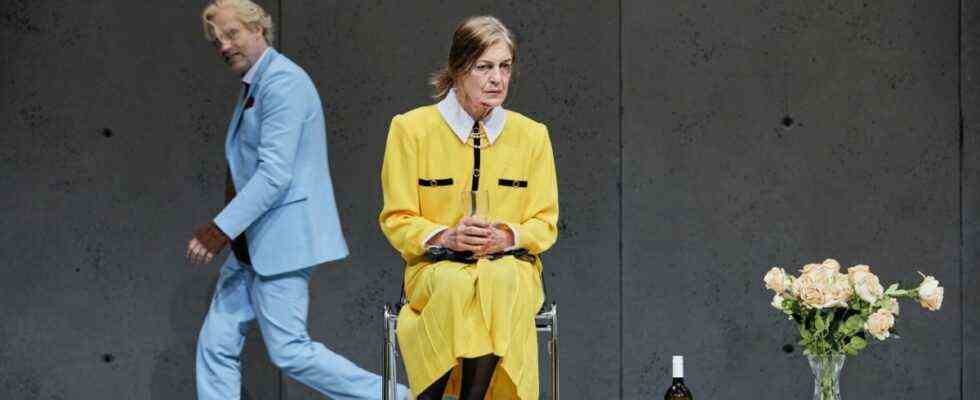What is real here, what is a trap, and doesn’t great art always tell the truth with its lies? Christian Kracht’s ingenious play with his fictional character called “Christian Kracht”, who is obviously related to the author but not identical to him, makes his novel “Eurotrash” shimmer in a beautiful, enigmatic manner. Apparently the author says everything on this excursion into his sad, broken family history – but only apparently and under the protection of fiction. This mirror cabinet game with the invented and the suffered biography is now being continued by Jan Bosse at the Berlin Schaubühne with his theater adaptation of Kracht’s profoundly sad and crazy comic novel.
Joachim Meyerhoff plays the first-person narrator, this puzzling figure oscillating between the real and the fictional Christian Kracht, who exposes everything and yet is almost impossible to grasp – and he plays it with the slight manic pressure with which he equips all of his stage characters. Because Meyerhoff is such a stunning high-energy actor, on the one hand it is a great pleasure, for example when he plays a crazy slapstick act with his crazy, confused mother’s ostomy bag filled with excretions. The word “art crap” takes on a whole new meaning.
Meyerhoff’s virile excess of strength is actually alien to the narrator
On the other hand, it may also be a big misunderstanding. Because if the shy, habitually rather limp and disturbed narrator figure is a bit strange, then it is the virile excess of strength with which Meyerhoff catapults himself through the evening. The entertainment theater professional Bosse and his Rampensau actor swiftly transform the Roma’s perplexed melancholy into a black comedy.
The fact that the staging does not reveal the novel, but celebrates it, is due to the actual central figure, the narrator’s eccentric mother, with whom he goes on a journey to the places of his childhood shortly before her death. At the Schaubühne, a ship serves as a travel vehicle to the Swiss glaciers, not a taxi (stage: Stéphane Laimé). That probably runs under theatrical poetry. Perhaps it is also a reference to the boat with which the young hero in “Fiberland”, Kracht’s first novel, rowed on Lake Zurich and into an uncertain future.
This lonely mother, a more or less crazy Zurich millionaire, has only been able to endure her life for a long time with severe alcoholism, toxic psychotropic drugs and regular psychiatric visits. In the upper class dragon with a purple monster wig and old-fashioned silk costume, always ready to rule waiters and other domestics and toss around 1000-franc bills, the traumatized woman becomes visible, the daughter of a staunch Nazi, the girl who was eleven years old was raped. The great Angela Winkler, who always plays as if she had never quite arrived in the adult world, gives this mother figure, despite all the shadows and the unmistakable madness, a dignity, an innocence and a retreat into a childlike inviolability that is breathtaking.

